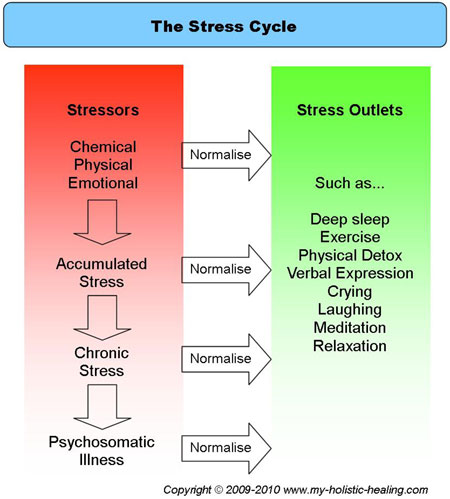How does stress contribute to ill-health?
The link between stress and illness is becoming well-known but the extent to which stress affects our health is often under-estimated. We all experience some form of stress to some extent from time to time but it does not always make us ill.
The key question we ask when talking about psychosomatic illness is ‘how much and how long has stress been a part of daily life?’
Psychosomatic Illness – What does it mean?
In strictly medical terms, psychosomatic illness is any physical dysfunction where the primary or major cause is psychological rather than physical. When we view psychosomatic illness from the perspective of holistic health, we see that all illness can be psychosomatic because the body reflects our mental, emotional and spiritual health.
The term ‘psychosomatic’ refers to the connection or the interaction between the body and mind. Therefore, psychosomatic illness refers to a physical dysfunction that is primarily caused by some form of emotional or mental stress – mild depression, work-related stress and even extreme personality traits can cause psychosomatic illness.
Any disruption to our mental, emotional or spiritual health creates stress in our energy centres or chakras so the more extreme or pro-longed the stress is, the more likely we are to experience a change in our physiology. Sometimes these changes go unnoticed until there is a severe dysfunction that causes us pain or discomfort.
Types of Stress – What are the different kinds of stress?
There are various aspects of living that contribute to our stress levels. There are three types of ‘stressors’ that cause a stress reaction in the body:
- Chemical – caffeine, alcohol, nicotine, sugar, drug use, high fat diet, household or environmental poisons such as air pollution, asbestos, heavy metals
- Physical – physical inactivity or overactivity, noise pollution, accidents, lack of sleep, barometric pressure changes
- Emotional – fear, anger, guilt, sorrow, jealousy, hurt, anxiety
Furthermore, the effects of these stressors on the body are additive, which means that stress accumulates with each additional small level of stress. For example, one sip of coffee may not cause a stress reaction but one sip of coffee, plus one puff of a cigarette, plus one heated argument, plus inadequate sleep, plus a day of sitting at a computer can cause a physiological change in the body’s chemistry. In other words, it all adds up!
The Stress Reaction – How does stress affect the body?
Excess physical, chemical or emotional pressure causes a ‘stress reaction’ in the body. The stress reaction is a state of ‘overdrive’ where our organs work overtime to enable us to keep functioning when under pressure – our fight-or flight response. Take a look at the chain reaction that occurs in the body when we are stressed:

During prolonged stress, the body is forced to maintain higher levels of these natural chemicals which eventually results in burnout. This is where the term ‘adrenal fatigue’ comes from – the adrenal system literally becomes fatigued from having to operate in overdrive for long periods. How long we can operate under this stress reaction all depends on our tolerance for stress or our ‘stress threshold’.
The Stress Threshold – When does stress turn into illness?
Each person has a different tolerance level for stress. Some people handle stress well while others don’t – it all comes down to individual make-up. When we reach our threshold for stress, some form of breakdown occurs, either physically, emotionally or both. It all depends on how much stress we endure and for how long – the effects eventually manifest in our physical health…

When we have a breakdown (or even a nervous breakdown), our bodies are naturally seeking an outlet in order to normalise our systems once again. When we fail to ‘normalise’ or find an outlet for our stress, it becomes our habitual way of functioning. This is when we cross the threshold from stress to chronic stress.
Chronic stress occurs when there is a build up of stress due to no outlet. And our bodies start to show the tell tale signs…tiredness, sore joints/muscles, skin breakouts, dark circles under the eyes, food cravings – the list goes on.
This is because over time, chronic stress restricts the blood flow through the body and weakens the immune system which can eventually cause physical dysfunction. These changes happen gradually on a cellular level according to the principles of quantum healing.
Breaking the Stress Cycle – How can I avoid stress build-up?
Each moment of every day, we have a choice to hold on to feeling stressed or let go. When we find an outlet for our stress, it short-circuits the body, mind and soul to restore balance. To avoid the stress cycle, try finding an outlet next time you feel stressed as it lowers blood sugar, reduces stress hormones and adrenalin…

Often the process of dealing with a psychosomatic illness can be a cathartic release. For instance, the common cold is often a physical release of old habits and emotional attachments so it can be a cleansing experience. You might find that after a cold, you feel lighter or seem to have more clarity. This feeling occurs when a physical illness has provided the final release of our old ways of being.











You must be logged in to post a comment.